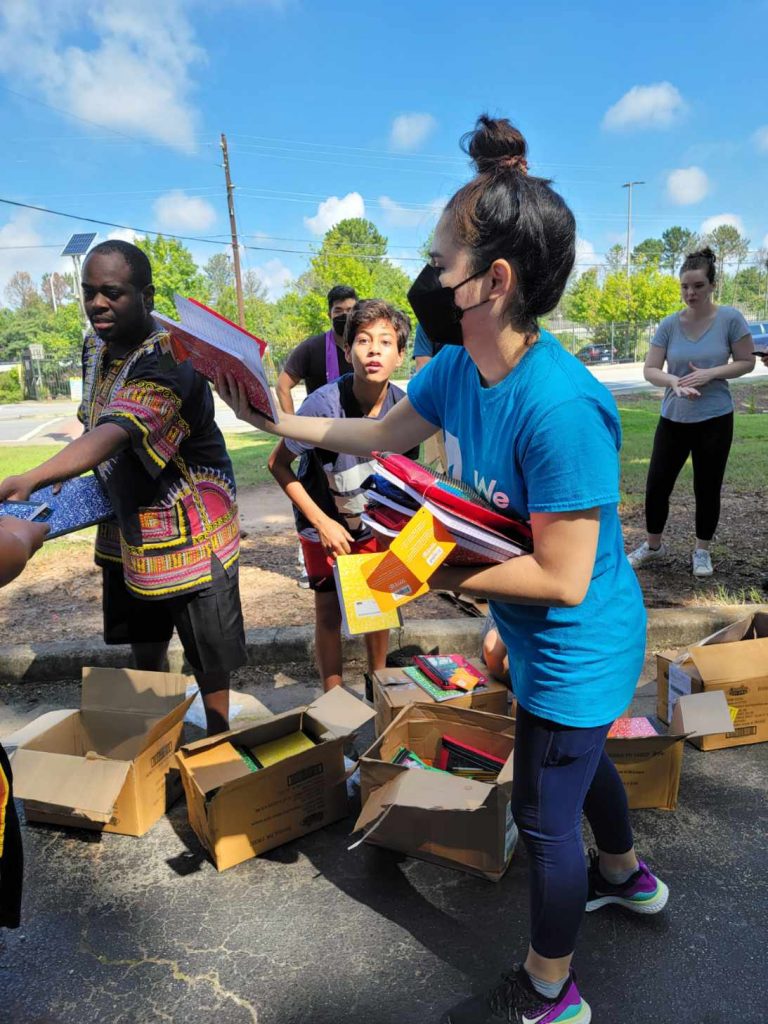By Dana Richie
The diverse and celebrated Buford Highway corridor north of Atlanta—including the cities of Brookhaven, Doraville, and Chamblee—is home to many multiethnic immigrant communities and businesses. We Love Buford Highway is a nonprofit organization dedicated to “bridging the world of need and …the world of art and culture and photography and storytelling” for this unique area, according to Community Engagement Director Natalia Garzón.
The organization focuses on three main areas of preservation in the Buford Highway corridor: voices, art, and community.
“There is a guardianship, there is a protective piece of this,” said Executive Director Lily Pabian. “That’s really in the space that we want to work and impact.”
During the initial onslaught of the COVID-19 pandemic, they shifted their attention and resources to the immediate survival of the community. Garzón said that it was difficult for nonprofits like We Love Buford Highway “to promote the arts and the humanities without recognizing that the people you are trying to serve also don’t have food or also need vaccines or also don’t understand what the humanities even means.”
Noticing that community members were not receiving the same COVID testing attention, they teamed up with other local organizations to establish “community-centric” testing locations, complete with instructions in multiple languages.
To address food insecurity exacerbated by the pandemic, they began the then-monthly Feeding Families event, providing culturally comforting food staples to about 980,000 people.
“Food is medicine,” Pabian said. “[For] our cultures and our families, the biggest form of love for them is cooking for their families.”
We Love Buford Highway was also eager to reinstate its humanities programming. With the addition of an outreach coordinator funded by a Georgia Humanities SHARP (Sustaining the Humanities through the American Rescue Plan) grant, the organization could devote more time and energy to its humanities efforts.
“There was a loss of stories there, too, along with a loss of livelihood and a loss of resources,” Garzón said. “It was a time for us to pivot back … and refocus our attention on storytelling.”

Feeding Families Event, Courtesy of We Love Buford Highway
For example, to preserve the diversity and vibrancy of Buford Highway, they formed a community archive, recording the lived experiences and stories of community members. The project “brings stories and brings a lot of the critical thought and opportunities that come with storytelling into a community that has historically been silenced or not given the space to share their stories,” Garzón said. “We’re trying to show people that it matters for them to tell their story.”
To thank participants, the organization provided a bag of food and cleaning supplies. “There was this way of building trust through meeting their needs,” Pabian said.
Among others, they shared the story of Delfina, a Guatemalan immigrant in her 60s. When asked about her experience coming to America, “within the first maybe 10 seconds, she just started crying,” Garzón said. “She was so moved by the fact that she was answering these questions.”
Delfina was thankful for the opportunity to share her story. She said to Garzón, “You know, I’ve been in this country for over 30 years, and no one has asked me those two questions before.”
Garzón noted that this is indicative of the fact that “access to the humanities is a privilege, and our communities don’t have a lot of privileges.”
Garzón believes that the community archive is critical to both give a platform and help the community embrace the humanities by establishing “that there is a space for them and what they’re saying matters and what they’re saying is important for the past, present, and future of a place like Buford Highway.”
Another way the organization has connected the community with the arts is through programs like Spaces Where We Belong, a community-sourced photography exhibit of the local spaces and places people “gravitate towards.”
Through events that share public humanities in the purest sense, Pabian believes that “we truly are representing and voicing a community that has been severely underserved and under-voiced for over 50 years.”
Both Pabian and Garzón are excited about the organization’s future, especially with the addition of the outreach coordinator. They both highlighted how important internal support is for the work they do in the community.
“A big part of the work that we do relies on trust,” Garzón said. “And trust takes time. And time takes money and people.”
The outreach coordinator is responsible for collecting community stories, working programs on the ground, and helping with the youth orchestra.
By connecting direct services with exposure to the humanities, Pabian plans for We Love Buford Highway to continue “to share how much life is here, how much vibrancy is here, and how much people do love Buford Highway.”
In December 2021, Georgia Humanities awarded more than $1.03 million in SHARP funding to 78 organizations across the state to support growth and recovery in response to the pandemic. Funding for the SHARP grant program was provided by the National Endowment for the Humanities (NEH) as part of the 2021 American Rescue Plan Act.

